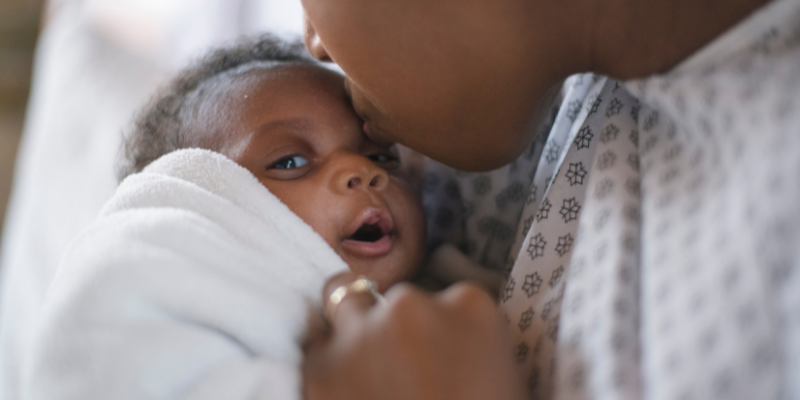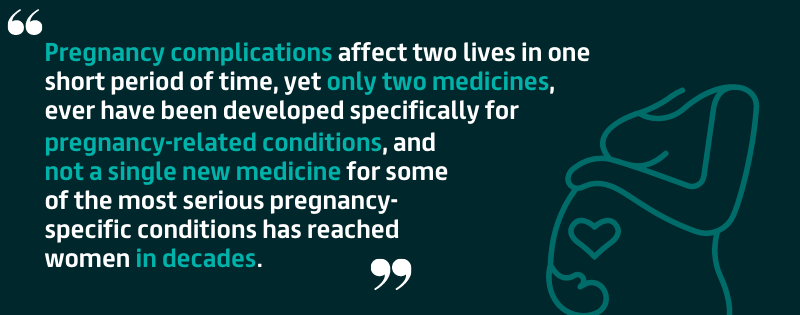.png.aspx)
Image: A mother holding a newborn baby.
At a time of unparalleled medical and scientific discovery, trialled and tested treatments are being delivered at pace and at scale for both common and rare diseases, but one group that has been completely failed is pregnant women.
Around the world, over 800 women and nearly 7000 newborns die every day and 5,500 babies are stillborn, almost all of which are preventable. Pregnancy complications such as pre-eclampsia, prematurity, haemorrhage, infection and birth asphyxia account for the majority of these deaths. For many more women and babies who experience these complications and who do not die, many will be left with life-long disabling consequences. Pregnancy complications affect two lives in one short period of time, yet only two medicines, ever have been developed specifically for pregnancy-related conditions, and not a single new medicine for some of the most serious pregnancy-specific conditions has reached women in decades. Pregnant women, clinicians and prescribers are expected to make treatment decisions during pregnancy in the absence of good safety data for the majority of medicines currently prescribed, because women are routinely excluded from clinical trials.
(4).png.aspx)
Breakthroughs in pregnancy research are paralysed by complex regulation, fear of litigation, ineffective advocacy, inconsistent public health messaging, and the high cost of clinical trials insurance. The reluctance to invest stems from the terrible legacy of thalidomide, a drug which has cast a long shadow over medicines in pregnancy. Thalidomide ultimately changed our relationship with all new medicines and has since driven our regulatory process and defined the way governments, regulators and pharmaceutical companies test and approve medicines for market. Whilst we have learnt lessons from the thalidomide tragedy, there is little recognition that the drug was introduced in pregnant women without clinical trials, and today’s environment for testing new medicines is very different from that in the 1950/60s.
For decades, the conversation around regulation and trials in pregnancy has not been revisited, despite three critical shortfalls: (i) the range of existing medicines used in pregnancy with limited understanding of their effectiveness or safety, for example, commonly-used drugs for controlling high blood pressure, where the evidence for their use comes from studies in non-pregnant adults; (ii) emerging new medicines, developed for conditions in adults, almost always exclude pregnant women from the clinical trials which evaluate them, even when the medicine could be valuable in pregnancy if we know that they are effective and safe; (iii) a lack of new drug development for pregnancy-specific conditions, such as pre-term birth.
Whilst it appears there are barriers at every hurdle, ‘difficult’ and ‘expensive’ are not reasons to look away. In January 2021, maternal health experts from the University of Birmingham and Birmingham Health Partners Centre for Regulatory Science and Innovation published the Safe and Effective Medicines for Use in Pregnancy: A Call to Action Report. They called on government, industry, regulators, researchers and funding bodies to stop excluding women and their babies from the modern world and give them access to the medicines they deserve.
The report also set out the need for UK leadership in drug evaluation and development for pregnant women and their unborn babies. The UK is one of the best-placed countries in the world to lead this important issue because of its integrated healthcare infrastructure; strong track record of running clinical trials in pregnant women; and longitudinal end-to-end health data records.
Garnering significant support from key sectors including health, research, litigation, industry and patient representative bodies, the report provided a springboard into action. Leaders from these fields have come together to establish a policy commission focussed on finding solutions to deliver safe, effective and accessible medicines in pregnancy. Over the course of three months experts comprised of patient groups, researchers, practitioners, regulators, insurers and industry presented evidence on what tools could and should exist to develop this important area of unmet health need. Utilising these inputs, the policy commission will propose a raft of recommendations to government to prevent needless deaths, improve public health and find new therapeutics to treat difficult and life-threatening conditions affecting mothers and their babies. The recommendations are currently taking shape and will be launched in late Spring 2022.
Delivering meaningful change for pregnant women and their babies relies on many key groups working together to deliver an end-to-end, joined-up solution where pregnant women are at the heart of decisions related to their health. Pregnant women should no longer be left out of medical innovation; they should be considered as equal to non-pregnant women and men. Part of this change is moving away from longstanding prevailing paternalism when it comes to pregnancy research – women should be empowered to make informed decisions about trial participation, based on clear and consistent guidance. The UK’s graded approach to clinical trials is by design set up to safeguard participants and there is a real case for inclusion of pregnancy in all clinical trials, particularly early trials, where a medicine could be used in pregnancy unless there are very specific concerns around safety. One of the myths around pregnancy research is that women do not want to participate. However, practitioners and researchers report that the opposite is true, many want to take part in clinical trials and be part of finding lifesaving medical innovations for themselves, their unborn babies and other pregnant women.
No one community can solve the unmet health needs of pregnant women on their own. The pharmacological community in particular will be absolutely vital to realising the opportunities and tackling the challenges ahead. Together, we have the opportunity to work with women and their families, regulators, funders, government, industry, researchers and healthcare professionals to address this huge longstanding gap in healthcare policy and provision. Maternal health is a key driver of human health and should be a priority for all governments and societies invested in the long-term health and wealth of their nations.
Read more from the Unmet health needs & health inequalities series
More from Unmet health needs & health inequalities
Comments
If you are a British Pharmacological Society member, please
sign in to post comments.